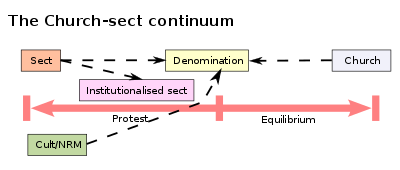Cult
The term has different, and often divergent or pejorative, definitions both in popular culture and academia, and has been an ongoing source of contention among scholars across several fields of study.[4] An older sense of the word cult, which is not pejorative, indicates a set of religious devotional practices that is conventional within its culture, is related to a particular figure, and is frequently associated with a particular place, or generally the collective participation in rites of religion.This sense of the term is weakly defined – having divergent definitions both in popular culture and academia – and has also been an ongoing source of contention among scholars across several fields of study.Weber is an important theorist in the academic study of cults, which often draws on his theorizations of charismatic authority, and of the distinction he drew between churches and sects.[22][2] This concept of church-sect division was further elaborated upon by German theologian Ernst Troeltsch, who added a "mystical" categorization to define more personal religious experiences.[23][2] Like Troeltsch's "mystical religion", Becker's cult refers to small religious groups that lack in organization and emphasize the private nature of personal beliefs.[19] Members of the anti-cult movement typically define a destructive cult as a group that is unethical, deceptive, and one that uses "strong influence" or mind control techniques to affect critical thinking skills."[34] In Cults and the Family, the authors cite Shapiro, who defines a destructive cultism as a sociopathic syndrome, whose distinctive qualities include: "behavioral and personality changes, loss of personal identity, cessation of scholastic activities, estrangement from family, disinterest in society and pronounced mental control and enslavement by cult leaders."[35] Writing about Bruderhof communities in the book Misunderstanding Cults, Julius H. Rubin said that American religious innovation created an unending diversity of sects."[36] In 2002, the German government was held by the Federal Constitutional Court to have defamed the Osho movement by referring to it, among other things, as a "destructive cult" with no factual basis.[39][19] In the 1950s, American social psychologist Leon Festinger and his colleagues observed members of a small UFO religion called the Seekers for several months, and recorded their conversations both prior to and after a failed prophecy from their charismatic leader.[43] A 1997 psychological study by Festinger, Riecken, and Schachter found that people turned to a cataclysmic world view after they had repeatedly failed to find meaning in mainstream movements.[51] The organizations that formed the secular anti-cult movement (ACM) often acted on behalf of relatives of "cult" converts who did not believe their loved ones could have altered their lives so drastically by their own free will.While scholars may believe that various less dramatic coercive psychological mechanisms could influence group members, they came to see conversion to new religious movements principally as an act of a rational choice.[70] In 1990, the court case of United States v. Fishman (1990) ended the usage of brainwashing theories by expert witnesses such as Margaret Singer and Richard Ofshe.In the case's ruling, the court cited the Frye standard, which states that the scientific theory which is utilized by expert witnesses must be generally accepted in their respective fields.[73][74] In the 1980s, clergymen and officials of the French government expressed concern that some orders and other groups within the Roman Catholic Church would be adversely affected by anti-cult laws which were then being considered.



Cult (disambiguation)Oxford English Dictionaryreligiousnew religious movementssocial groupsspiritualphilosophicalritualspejorativepopular culturesociologicalstudy of religious behaviorChristian countercult movementunorthodox beliefsanti-cult movementbrainwashingderogatorya set of religious devotional practicesimperial cult of ancient RomeSociological classifications of religious movementssocially devianttotalitariancharismaticcommon interestCatherine WessingerWaco siegesecularanti-cult movementsnew religious movementeuphemismAcademic study of new religious movementsHoward P. BeckerErnst TroeltschMax Webercharismatic authoritydistinction he drewchurchesecclesiadenominationdeviantschismWilliam Sims BainbridgeRodney StarkChurch of ScientologyconversionaffiliationJohn LoflandUnification Churchdoctoral thesisJ. Gordon MeltonJames R. LewisPsychologistMichael LangoneInternational Cultic Studies Associationsociopathicsyndromepersonality changespersonal identityBruderhof communitiesMisunderstanding CultsLorne L. DawsonFederal Constitutional CourtdefamedOsho movementJohn A. SalibaPeoples Templemass suicideDoomsday cultapocalypticismmillenarianismdisastersocial psychologistLeon FestingerUFO religionWhen Prophecy Fails: A Social and Psychological Study of a Modern Group that Predicted the Destruction of the Worldworld viewpolitical actionideologyfar-leftfar-rightTim WohlforthChristian denominationshereticalorthodoxyevangelizeAum ShinrikyoJonestownconvertsfree willpsychologistssociologistsdeprogrammingmass mediakidnappingpsychological abusesexual abusecriminal activitycoerciverational choiceGovernmental lists of cults and sectspublic policyHeterodox teachings (Chinese law)Falun GongChinese governmentxiéjiàoimperial ChinaRussian Interior MinistryPagan cultsRussian Ministry of JusticeThe Church of Jesus Christ of Latter-day SaintsJehovah's Witnessesneo-Pentecostalsbrainwashing theoryU.S. courtreligious freedomFirst Amendment of the United States Constitutionestablishment of religionfreedom of religionfreedom of speechfreedom of the pressfreedom of assemblyimmunitycriminal prosecutioncourt caseMargaret SingerRichard Ofshe